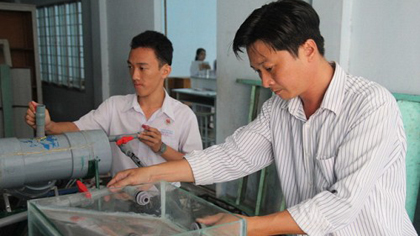Vietnamese teacher, students develop water desalination machine to battle historic drought
A physics teacher and his students at a high school in the Mekong Delta province of Ben Tre have developed a solar-powered water desalination machine to provide precious drinking water for the drought-stricken area.
Physics teacher Truong Huu Dung and his students at Nguyen Dinh Chieu High School in Ben Tre City, the provincial capital, are in the final stage of creating a water desalination machine that costs around VND2 million (US$90) and could produce six liters of fresh water a day.
“Salt water is stored in an insulated bottle made up of two layers of plastic separated by an insulating layer, and then heated by a vacuum tube taken from a water heater machine. The vapor will follow a tube into the distillation pot to be condensed into fresh water,” Dung explained.
Simple as it sounds, the machine is the fruit of a long and arduous process of trial and error by the team, which even included a small explosion caused by high pressure inside the insulated bottle.
The idea for the machine came three years ago when Dung and his student Nguyen Thanh Dat were revisiting the hometown in Thanh Phu District in Ben Tre Province.
 |
| Truong Huu Dung (R) and a student on his team at Nguyen Dinh Chieu High School in Ben Tre City, Ben Tre Province, are pictured monitoring the water desalination machine. |
Dung recalled how he and Dat had witnessed the hardship of residents living without fresh water in the district, which invariably suffers from drought and salinization six months a year.
“Dat asked me whether there was a way to turn salt water into drinkable fresh water,” Dung said. “With my knowledge of physics, I knew for sure it was possible, so I encouraged Dat to come up with specific ideas.”
With the idea conceived, Dung, Dat, and another student Ho Ngoc Kien Uyen rolled up their sleeves to start developing the desalination machine in 2014.
The initial prototype consisted of a clay pot for storing salt water, a parabolic reflector that turns solar energy into thermal energy to heat the salt water, and a distillation compartment to collect fresh water.
The prototype, however, proved inefficient since it failed to retain heat for a long enough time without constant solar exposure, meaning the amount of distilled water produced was too little.
The group’s project was put on hold when members Dat and Uyen had to attend university in Ho Chi Minh City, and the school’s science budget was too tight.
Dung, however, was motivated to restart the project in mid-2015 after the province suffered from a harsh drought that deprived thousands of its residents of fresh water, while his school struggled to find an affordable desalination machine to provide drinking water for its students.
He said a machine of this type costs over VND60 million ($2,700), which was too expensive for his school to afford.
Currently, Dung and his student team are working on the third prototype of the machine that he expects could be mass-produced for residents in the province.
The team has been spending most of their time after school in the laboratory to finish their machine as quickly as possible given the worsening drought in the Mekong Delta region of Vietnam.
Nguyen Tan Loi, a junior at Nguyen Dinh Chieu High School and a member of Dung’s new student team, said he and his friends had been busy with the machine, even on Sundays.
“In order for the machine to operate efficiently and the calculations to be precise, we have to monitor the equipment every couple of minutes throughout the day,” Loi said.
Dang Buu Truyen, principal at Nguyen Dinh Chieu High School, said he greatly appreciates the science project that Dung and his team are undertaking, noting that one of the most important missions of the school is to encourage and nurture such ideas among students in order to build a base for their future careers.
Truyen added that his school had made a plan to upgrade its laboratory to facilitate scientific research in the school.
With the near completion of the machine, the team hopes to soon offer residents in their hometown an affordable alternative to get access to fresh water.
(Source: TTO)
 về đầu trang
về đầu trang







